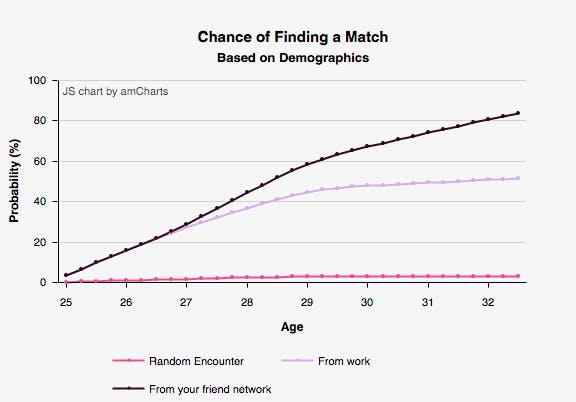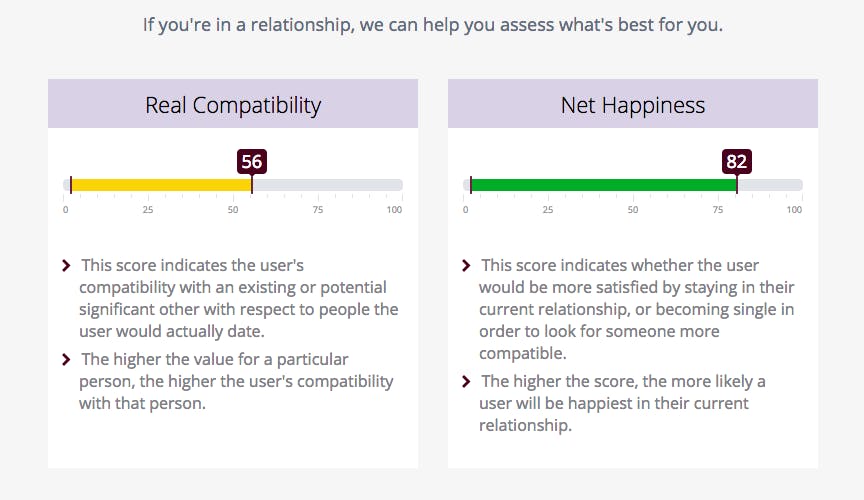When you start your journey into online dating, you’re liable to spend as much time searching for the right website or app as you will for the right partner. There are hundreds of options out there, each taking a different approach to ultimately reach the same conclusion: finding you “the one.”
Dating apps all function with a similar conceit; if you just fill out enough forms, answer enough questions, add enough photos to get the perfect profile picture, then an algorithm will eventually be able to chew up your data and spit out your perfect match.
The truth is, the most important factors in online dating are entirely out of your control.
Race and class are huge driving forces of people in online dating, and most guys don’t even bother reading profiles (not that it would matter because 80 percent of people lie about themselves in their profile). Perhaps most damning is a study commissioned by the Association for Psychological Science that found dating algorithms have no better a success rate than meeting someone at a bar.
Maybe the problem stems from the matching process itself, where a computer tries to quantify you—an idealized version of you—and match it with an idealized version of someone else. It all takes place in a vacuum where personalities can be solved like a math equation. Instead of figuring out who you’re happy with in your given situation, it might be better to figure out what situation you’re most likely to be happy in.
Rashied Amini believes he may have the solution to this problem in Nanaya, a new site that promises to “predict the future of your love life” using science, algorithms, and big data.
He may be on to something. After all, forecasting and future analysis is kind of his thing. The NASA JPL systems engineer was part of a team responsible for casting scenarios for Lunar and Martian base building and forecasting NASA’s demand for nuclear fuel for use in space nuclear power systems. Now he’s aiming to land on a more abstract target: love.
Amini said when he moved to Los Angeles, he used OkCupid for meeting new people, but he hasn’t used dating sites for much beyond research. “For me, it’s a lot of fun to reverse engineer how the matching algorithms work across different sites, whether it’s OkCupid, eHarmony, or Chemistry,” he told the Daily Dot.
“Each service’s method of personality analysis and matchmaking is different; each have their pros and cons. I’ve tried to learn from those pros and cons to come up with something more robust that integrates personality testing and life values.”
While gleaning what he could from existing services, Amini has his own approach in mind with Nanaya.
“[It’s] far closer to designing a space mission than matchmaking.”
All dating sites operate on the idea that their users are missing something in their life—generally a romantic partner—and present themselves as the silver bullet (or arrow) to solve the problem.
With the standard dating service, users go on date after date after date with different people presented as compatible—not just compatible but with 80 or 90 percent compatibility as calculated by detailed but entirely unexplained algorithms protected like the 11 herbs and spices in KFC’s secret recipe. But as we know, those odds don’t always prove so promising.
In the love equation, most dating sites don’t take into account outside variables. Nanaya aims to fill in those gaps. If OkCupid, Match.com, and the like are car dealerships, Nanaya is the CarFax report. “Nanaya doesn’t perform matchmaking like other sites. We will ‘matchmake’ people with cities and groups of people, which is fundamentally new,” Amini says.
“Matchmaking looks at a couple. Nanaya looks at the couple and everything that romantically affects their lives. Because Nanaya looks beyond the couple to analyze the whole system and how user psychology impacts a long-term behavior and happiness, [we] think Nanaya will provide far more accurate outcomes.”
The scope of Amini’s project is huge—accounting for all sorts of social behaviors and complexities that factor into a person’s life. Static on the screen that prevents the picture from being as clear as it should. Amini says understanding dating and romance and attempting to boil it down to a science is “far closer to designing a space mission than matchmaking.”
The cost-benefit analysis of love
Amini compares what Nanaya does to “the secretary problem,” a famous probability and statistics problem that deals with the optimal stopping theory.
In the problem, an administrator is interviewing applicants for a secretary position. The applicants are interviewed one-by-one at random and a decision on the applicant must be made immediately after the interview. Once rejected, an applicant cannot be revisited and the administrator is unaware of the remaining applicants. The conundrum is when do you stop interviewing and how do you know if you hired the right person?
What Nanaya wants to be is the compass that directs them where best to set sail.
Amini believes dating operates similarly, both for single people and for existing couples. The first step in answering the question is understanding that there is no “the one,” regardless of what every romantic comedy ever tells you. There are, instead, likely many people who may be an ideal fit. What Nanaya aims to determine is what the optimal situation is for a user to find a successful relationship.
For the generation of people hitting the strides of their 20s and 30s, a lot of growing up is taking place. Like the Ikea furniture that you’ll spend most of those years filling your apartment with, the assembly process of life isn’t as straight-forward as promised and rarely comes out looking like the picture on the box. The idea of starting a long term relationship without your own house in order becomes untenable—you wouldn’t put a delicate vase on a table with a slanted top.
The evidence is everywhere. According to Pew Research, a record number of people 25 and older have never been married, due in large part to economic challenges. More than half of Americans are single according the Bureau of Labor Statistics, a first since the government began recording such information, and single people are less likely to have the standard anchors of adulthood: They don’t have kids, they don’t own homes or property, and many of them are in flux when it comes to employment.
People entering adulthood are going to float. What Nanaya wants to be is the compass that directs them where best to set sail.
Little fish, big data
The biggest obstacle in executing analysis on a massive scale is having enough data to work with. Amini said that he was inspired during his research by the OkCupid blog, OkTrends, which regularly updates with trends and insights the company gathers from its users. “Unlike OkCupid I won’t mess with anyone’s user experience!” Amini promises, but it’s an easy promise to carry out for the time being because OkCupid has millions of users. Nanaya is in the thousands according to a recent blog post.
“Unfortunately, I don’t have a huge database of personalities so I have to build it. Every person that does a personality test helps bring Nanaya closer to reality,” Amini explains. “Before anyone takes a personality test, we ask them to fill out some details about who they are. This is totally anonymous but gives us metadata that lets us map out romantic personalities across cultures, places, and career.”
Amini has been collecting data since the site first launched in September 2014. He said the site recently went “unexpectedly viral” in Greece, and he’s hoping to collect enough data to open the site up into beta.
“A major part of our algorithm takes into account that future life decisions aren’t set in stone.”
Once that happens, Nanaya’s algorithm will start putting people in their ideal situation, like the Sorting Hat cast as Cupid. As users take various questionnaires dressed up as Buzzfeed-style quizzes, they’ll be loading Nanaya with tons of valuable information.
“For all users we’ll ask them to do another personality test to determine the traits of a person a user would be compatible with. We also ask a user about where they live, where they work, how they socialize, and other details that give us an idea of social behavior,” Amini explains. “We then look through our database and others to find the raw probabilities of meeting a match. Mixing those two things give us a probability in time of finding a match.”
The more information Nanaya can collect, the better result it can produce. That means asking some tough questions, including ones that people may not have an answer for on the ready. Questions like “do you want children?” or “do you want to settle down?”
When asking those questions for the purposes of matchmaking, people may be more inclined to try to answer “correctly” to appease an imaginary ideal partner. Amini’s hoping for more honest answers. “I want Nanaya to be a tool to help people sort out what they want in life,” he says.
Nanaya is also built to take into account those years of young adulthood where things are decidedly less definite. “A major part of our algorithm takes into account that future life decisions aren’t set in stone. We know that people typically don’t plan their lives five years from now, particularly if they’re single,” Amini explains. “This let’s us incorporate uncertainty and also help people make decisions about moving if they’re partly driven by meeting friends or finding romance. I really hope to expand this functionality in time as its own product as our database grows.”
An imperfect ideal
While the goal for Nanaya may be to get users to do some soul searching and come out with a version of themselves that is happier and therefore more likely to be happy in a committed relationship, love is still very much a part of the equation. Because as every chronically single person knows, even things that aren’t about love are actually about love.
“If people are in relationships or explicitly seeking a relationship, we ask more questions about what they want out of life and how they feel about their current situation,” Amini says. “We ask about romantic history and try to determine how a person feels while they’re single.” From the Nanaya database comes suggestions on where a person is likely to find conditions conducive to a relationship.
“For people who are single and are trying to find friends or a match, I think Nanaya provides really good insights. You can’t just sign onto a dating site and find out what city is the best for you. Some people might literally be looking for love or friendship in all the wrong places,” Amini suggests. He believes Nanaya can help push people out of their comfort zones by showing them the odds of finding a partner in different situations. “I think for people who are single, Nanaya is a good tool to broaden your horizons and gain insights without the pressure or anxiety of online dating,” he says.
For people in a relationship, Nanaya’s utility is more complicated. Amini notes that OkCupid’s match probability isn’t a strong indicator of compatibility in practice—if a couple signed up and found one another on OkCupid, they may be surprised to find the site suggest they are far less affable in theory than in they are in practice.
The secretary problem comes into play again. A person may be feel satisfied in a relationship until they’re told there is another potential relationship out there. Is the relationship they are in the optimal stopping point or is there something better out there? That’s a question Nanaya aims to help answer, suggesting on its FAQ page that it can tell users “Whether or not it’s best to stay with the person you’re with.”
The idea raises a different question: Just because the algorithm can suggest a person could be happier, should it?
The concept of optimization in one’s love life, the possibility that there may be a situation out there that could be closer to ideal, doesn’t seem any different than the romanticized idea of soulmates. Nanaya may acknowledge that there is no “the one,” but by suggesting there may be a better one, it’s essentially encouraging the same chase.
No magic number
Amini acknowledges that his algorithm isn’t going to solve the problem of loneliness. “I’m not going to promote Nanaya as a magic bullet or promise happiness, like some dating sites may. Life and relationships are what people make them out to be,” he admitted. He does believe that “numbers do give an idea and an idea is better than nothing.”
“Especially in the case of couples,” he says, “I really hope that people use Nanaya together in an open way. I really hope Nanaya spurs constructive conversations between two people to understand if they really are meant for each other.”
In all, he hopes Nanaya isn’t just another dating site and it will encourage people to take a closer look at their own lives to figure out what will make them happy.
“Of course there’s numbers waiting for users at the end of the road,” Amini said, “but I imagine the journey will be a lot more worthwhile than the destination.”
Update 1:34pm CT, Jan. 28, 2015: The headline of this article original referred to Amini as a former NASA engineer when he still holds that position. The headline has been updated to reflect this.
Photo via j0sh/Flickr (CC BY 2.0)


